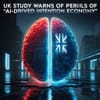A recent study from the UK has sounded a warning about the potential dangers of an "intention economy" driven by artificial intelligence (AI). The intention economy refers to a system where AI algorithms are used to anticipate and manipulate people's desires and intentions, often for commercial gain.
The study, conducted by researchers at the University of Cambridge, highlights the risks of an intention economy, including the potential for AI systems to exploit people's vulnerabilities and manipulate their behavior. The researchers warn that this could lead to a range of negative consequences, including the erosion of personal autonomy, the exacerbation of social inequalities, and the manipulation of democratic processes.
One of the key concerns raised by the study is the potential for AI systems to use "dark patterns" to manipulate people's behavior. Dark patterns refer to design techniques used to influence people's behavior in ways that are not in their best interests. The researchers warn that AI systems could use dark patterns to exploit people's psychological vulnerabilities, leading to a range of negative consequences.
The study also highlights the need for greater transparency and accountability in the development and deployment of AI systems. The researchers argue that there is a need for more robust regulations and standards to ensure that AI systems are designed and used in ways that respect people's autonomy and dignity.
Overall, the study provides a timely warning about the potential dangers of an AI-driven intention economy. As AI systems become increasingly pervasive in our lives, it is essential that we take steps to ensure that they are designed and used in ways that promote human well-being and respect for human autonomy.


